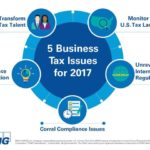
Is the US Supreme Court About To Give the US a Wealth Tax?
INTERVIEW ON THE PRICE OF BUSINESS SHOW, MEDIA PARTNER OF THIS SITE.
Recently Kevin Price, Host of the nationally syndicated Price of Business Show, interviewed Alex Brill.
In December, the Supreme Court will hear oral arguments in Moore v. United States, a case to determine whether the mandatory repatriation tax (MRT) is constitutional. We have submitted an amicus brief in support of the respondent (the US government) arguing that the MRT is constitutional as an indirect tax. Moreover, we also explain that any ruling that introduces a realization requirement would disrupt the US income tax system and the US economy.The MRT, which was introduced in 2017 as part of the Tax Cuts and Jobs Act (TCJA), imposed a one-time transition tax on undistributed foreign profits. The purpose of this tax was to transition from the previous regime, which taxed the foreign profits of US-based multinational corporations but allowed corporations to defer the tax as long as the foreign profits were reinvested in ongoing foreign operations, to a new tax system that mostly exempted foreign profits from taxation.The Moores are shareholders in a foreign manufacturing business and were subject to the MRT on the business’s undistributed profits. They argue that the tax is an unconstitutional direct tax because the 16th amendment, which authorizes income taxation without apportionment among the states, only applies to taxes on realized income while the MRT taxes unrealized income. The Moores and several amici further argue that this also means that a wealth tax would be unconstitutional.Although we agree that a wealth tax is likely unconstitutional (and undesirable), we think that the MRT is nothing like a wealth tax and that the court should not use this case to reopen the constitutional meaning of “income” under the 16th Amendment.Our brief makes two main arguments… (click here for the rest of the article)
According to the American Enterprise Institute, “Alex Brill is a resident fellow at the American Enterprise Institute (AEI), where he studies the impact of tax policy on the US economy as well as the fiscal, economic, and political consequences of tax, budget, health care, retirement security, and trade policies. He is the editor of Carbon Tax Policy: A Conservative Dialogue on Pro-Growth Opportunities. Before joining AEI, Brill served as the policy director and chief economist of the House Ways and Means Committee. Previously, he served on the staff of the White House Council of Economic Advisers. He has served on the staff of the President’s Fiscal Commission (Simpson-Bowles) and the Republican Platform Committee (2008). He is also the founder and CEO of the economic consulting firm Matrix Global Advisors (MGA). Brill has an MA in mathematical finance from Boston University and a BA in economics from Tufts University.”
Check out more national news stories here.
LISTEN TO THE INTERVIEW IN ITS ENTIRETY HERE






